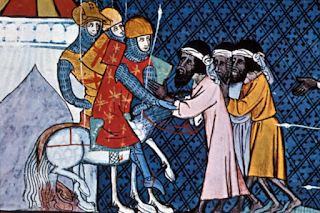The second post ever published on this blog might seem somewhat recherché to some of you now but the outcry it provoked among conservative Catholics evidently hit a raw nerve with the BBC.
Our findings proved that Radio 4's Sunday programme, presented by a trustee of the liberal Catholic magazine The Tablet (Edward Stourton), overwhelmingly used Catholic voices associated with The Tablet to discuss Catholic matters.
It was a palpable hit. Things changed on Sunday for a few years after that. We heard far less from Tablet voices and, in the immediate wake of the outcry, Sunday suddenly began featuring voices from the Tablet's main rival, the conservative Catholic Herald (previously totally excluded).
As we've not pursued the matter much since then, Sunday has started slipping back again, especially in the past couple of years. Maybe it's time to revisit that second post.
It was a palpable hit. Things changed on Sunday for a few years after that. We heard far less from Tablet voices and, in the immediate wake of the outcry, Sunday suddenly began featuring voices from the Tablet's main rival, the conservative Catholic Herald (previously totally excluded).
As we've not pursued the matter much since then, Sunday has started slipping back again, especially in the past couple of years. Maybe it's time to revisit that second post.
*******
Meanwhile, the death of the liberal former Archbishop of Westminster Cormac Murphy O'Connor brought tributes on this morning's Today from Tablet editor Catherine Pepinster and, yes, Edward Stourton, and reminded me of my own favourite long-term study of the BBC: my ten-year review of the speakers on Thought For The Day.
A side-finding of that study was that Today's choice of Catholic voices was entirely restricted to liberal Catholic voices. There wasn't a single conservative Catholic among them.
The phrase 'BBC Catholic' was used by some conservative Catholics about such people - evidently with good reason.
A side-finding of that study was that Today's choice of Catholic voices was entirely restricted to liberal Catholic voices. There wasn't a single conservative Catholic among them.
The phrase 'BBC Catholic' was used by some conservative Catholics about such people - evidently with good reason.
Talking of conservative Catholic critics of the BBC....
The Catholic Herald had a very interesting piece by David Paton this week on the BBC's schools output.
It focused on a BBC Bitesize page called Medical stagnation in the Middle Ages which blamed Christianity for medical stagnation in the Middle Ages and repeated now-discredited claims that the Church prohibited dissection (in favour of "superstition") but provided one glimmer of good news: namely Islam...
The Catholic Herald had a very interesting piece by David Paton this week on the BBC's schools output.
It focused on a BBC Bitesize page called Medical stagnation in the Middle Ages which blamed Christianity for medical stagnation in the Middle Ages and repeated now-discredited claims that the Church prohibited dissection (in favour of "superstition") but provided one glimmer of good news: namely Islam...
The relevant BBC Bitesize passage reads:
The question here is whether that page, from the early 2000s ('no longer updated'), still plays a part in the education of British pupils. It's to be hoped not.
Even BBC Radio 4 Making History presenter Tom Holland (a wonderful historian and engaging tweeter) was aghast on learning about this BBC Bitesize commentary, calling it "so grotesquely wrong as to be laughable".




The Australians used to talk about the "cultural cringe" - referring to how cowed Aussies ascribed virtue and superiority to the culture of the old English colonial master. Something similar seems to have been invented and promoted by the BBC - the notion that all that is best in civility, culture and scientific advance is to be found in the Islamic world, despite the reality being that Islamic countries are generally sinks of barbarity,corruption, economic stagnation (except where there is oil), discrimination and persecution of non-Muslim minorities, whilst making virtually no contribution to science or the arts, in terms of global impact. How to explain this remarkable state of affairs? Colonial guilt? Fear? Genuine delusion? I wouldn't underestimate colonial guilt - most BBC managers are from the upper middle classes and their families will have benefitted directly from imperial exploitation and employment in the past and patriarchs in the family would have expressed frankly racist views around the dining table. People who used to run the British Empire now run the labyrinthine BBC, and carve out personal empires there. Bad conscience about how their families once exploited poor people all over the globe might go some way to explaining it. But I think as well the Islamic lobby is also very good at pushing the BBC's guilt buttons using a mix of emotional appeal, bogus history and intimidation.
ReplyDeleteWas that when they decided to fight back by sending us Sir Les Patterson as their cultural attache?
ReplyDeleteWhat you say about the managerial class and post-colonial guilt sounds plausible. Hitler and the last war gave impetus to the development of current preoccupation with race and rights and all that. It hasn't quite turned out the way envisaged or intended, though.